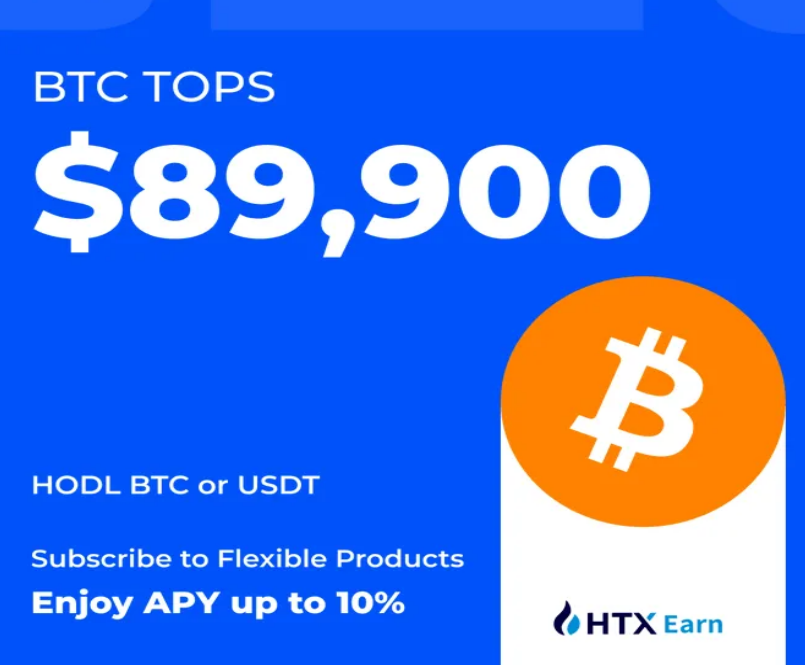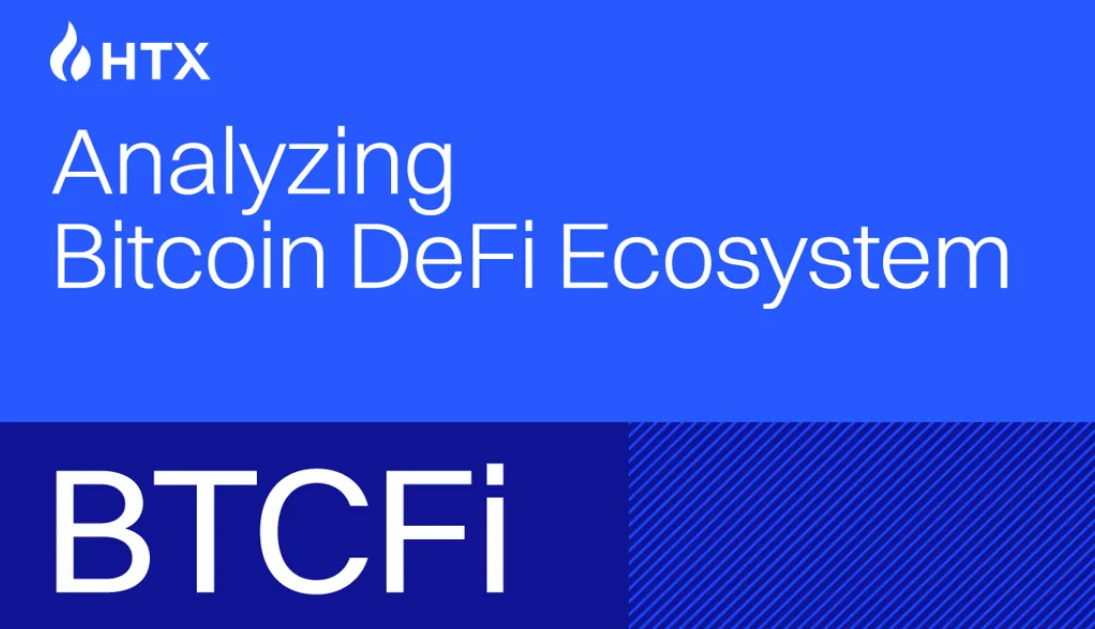The BTCFi ecosystem expands the financial functions of Bitcoin through decentralized financial protocols, enhancing its position in the global financial system.
Author: htxofficial
Translation: Blockchain in Plain Language
In the fluctuating and transformative global financial environment, the rise of digital currencies has become an undeniable trend, especially with Bitcoin, the largest digital asset, leading the way. Currently, the financialization process of Bitcoin is accelerating. The victory of Donald Trump in the 2024 U.S. presidential election will bring new uncertainties and shocks to the global economy. However, against this backdrop, Bitcoin's price has reached a historic high, attracting widespread attention from global investors.

BTC | USDT annualized yield up to 10%
The surge in Bitcoin's price forms a subtle interaction with Trump's victory. Historically, when political transitions bring uncertainty, Bitcoin, known as "digital gold," often receives more attention as a safe-haven asset. This trend is particularly evident in 2024. Trump's policy inclinations regarding taxes, fiscal spending, and cryptocurrency regulation differ from those of previous administrations. He has publicly supported Bitcoin and the broader cryptocurrency market, which has triggered changes in market sentiment and expectations. As a hedging tool against global economic uncertainty, Bitcoin's value continues to rise, highlighting the increasingly important role of decentralized assets in the global financial system.
As Bitcoin reaches historic highs, the BTCFi (Bitcoin Finance) ecosystem is also rapidly developing. BTCFi is not just an extension of Bitcoin as a store of value; it is a groundbreaking innovation that integrates Bitcoin into the decentralized finance (DeFi) ecosystem. By supporting decentralized lending, staking, stablecoin issuance, and other protocols, BTCFi endows Bitcoin with new financial functions, promoting the development of a more mature financial ecosystem. In this broader context, this article will delve into the rise of the BTCFi ecosystem and its core mechanisms, analyze Bitcoin's market performance in the new political environment, and explore how BTCFi projects are shaping the future of Bitcoin. By analyzing several key projects, we will explore Bitcoin's role in the global financial system and its future growth prospects, further revealing the strong potential of Bitcoin's financialization.

1. Overview of the BTCFi Ecosystem
1) Definition and Core Concepts of BTCFi
BTCFi (Bitcoin Finance) is a financial service platform and protocol built around Bitcoin (BTC) and its ecosystem, integrating decentralized finance (DeFi) technology. Its core mission is to provide Bitcoin holders with more diverse financial applications through decentralized protocols, such as lending, staking, and stablecoin issuance, thereby expanding Bitcoin's financial functions.
2) Main Features of the BTCFi Ecosystem Include:
Decentralization and Autonomy: BTCFi operates through decentralized protocols and smart contracts, eliminating reliance on traditional financial intermediaries and enabling autonomous financial operations.
Financialization of Bitcoin: BTCFi transforms Bitcoin from a mere store of value into a multifunctional financial asset that can be used for lending, staking, and participating in stablecoin issuance, broadening its financial application scenarios.
Diverse Financial Services: BTCFi is not only a tool for storing Bitcoin's value but also integrates various DeFi application scenarios, including lending, staking, and stablecoins, providing Bitcoin holders with diverse sources of income.

3) Development Background of BTCFi
Since its inception, Bitcoin has been regarded as "digital gold," primarily used for value storage and cross-border payments. However, due to Bitcoin's lack of native smart contract functionality, traditional DeFi protocols (such as those based on Ethereum) have been unable to widely support Bitcoin's use. Therefore, integrating Bitcoin into the DeFi ecosystem has long been a significant challenge faced by the Bitcoin community and the cryptocurrency industry.
With the development of cross-chain technology and Layer-2 solutions, Bitcoin's DeFi ecosystem is gradually taking shape. Especially with the rise of cross-chain protocols, Bitcoin can interoperate with other blockchains (such as Ethereum and Solana), enabling its application in smart contracts and DeFi services.
4) Current Market Status of BTCFi
As of 2024, the BTCFi ecosystem has entered a rapid development phase. Lending platforms, staking platforms, and stablecoin protocols based on Bitcoin have been launched one after another, attracting a significant influx of capital. Platforms like Babylon, Helium, and Shell Finance have become important participants in the BTCFi ecosystem, demonstrating that Bitcoin is not only a store of value but also a digital asset with multiple application scenarios capable of participating in the global financial system.
Meanwhile, with the rise in Bitcoin's price and the expansion of the DeFi market, BTCFi has attracted widespread attention from Bitcoin holders, investors, developers, and innovators. This attention has driven the formation of a diversified financial ecosystem, further accelerating the financialization of Bitcoin globally.
2. Analysis of BTCFi's Core Mechanisms
1) Lending Protocol
The lending protocol is one of the most important applications in the BTCFi ecosystem. Traditionally, Bitcoin, as a digital asset, has not participated in the lending market. However, the BTCFi protocol enables Bitcoin to be used as collateral for decentralized lending. BTCFi lending protocols typically adopt a P2P (peer-to-peer) mechanism, allowing borrowers to use Bitcoin as collateral to borrow other digital assets or fiat currencies.
Liquidium: The Liquidium platform allows Bitcoin holders to obtain loans in other assets by staking Bitcoin. The platform utilizes smart contracts for automated operations, ensuring the safety of funds for both borrowers and lenders. While paying interest, borrowers can also earn interest on their staked Bitcoin.
- Shell Finance: As another typical BTCFi lending platform, Shell Finance provides cross-chain lending services, allowing users to borrow stablecoins using Bitcoin as collateral. Users can use these stablecoins for value-adding activities in DeFi protocols or as liquidity providers.
The success of these lending platforms marks a breakthrough for BTCFi in providing liquidity for Bitcoin holders, laying a solid foundation for Bitcoin's integration into the DeFi ecosystem.

2) Stablecoin Protocol
The stablecoin protocol in BTCFi issues stablecoins pegged to the price of Bitcoin using Bitcoin and its derivative assets (such as Ordinals and Rune) as collateral. Given Bitcoin's high volatility, the stablecoin protocol adjusts supply and circulation through smart contracts and decentralized mechanisms to maintain stability with Bitcoin's price.
Shell Finance's Bitcoin-pegged Stablecoin: Shell Finance allows users to issue stablecoins by staking Bitcoin through its decentralized stablecoin protocol, thereby providing liquidity across multiple DeFi protocols. This stablecoin benefits from Bitcoin's price backing, reducing the credit risk associated with traditional stablecoins.
- Babylon Stablecoin: Babylon offers stablecoins backed by Bitcoin, allowing users to stake Bitcoin as collateral. Babylon's stablecoin features cross-chain functionality, supporting circulation across multiple chains.
The introduction of stablecoin protocols in BTCFi not only increases Bitcoin's liquidity but also provides a more stable payment tool for Bitcoin's application in global payment systems.

3) Staking Mechanism
In the BTCFi ecosystem, the staking mechanism allows Bitcoin holders to earn rewards by staking Bitcoin on decentralized networks. Since the Bitcoin protocol itself does not support PoS consensus, this mechanism is typically implemented through cross-chain technology or Layer-2 solutions.
Babylon Staking Platform: Babylon collaborates with multiple public chains, allowing users to stake Bitcoin on these public chains. Users can earn rewards through staking, and the platform also provides certain risk protection measures.
- Helium Cross-chain Staking: Helium utilizes cross-chain technology to support staking Bitcoin on other blockchains that support PoS consensus. This way, users can earn Bitcoin staking rewards while contributing to the security of other blockchains.
The staking mechanism significantly enhances Bitcoin's liquidity, providing Bitcoin holders with opportunities for value appreciation.
4) Re-staking Mechanism
The re-staking mechanism is an innovative feature in the BTCFi ecosystem. Users can re-stake already staked Bitcoin or other crypto assets to earn additional rewards. Unlike traditional staking mechanisms, re-staking has higher yield potential and maximizes the utilization of cross-chain assets.
Eigenlayer: Eigenlayer is a protocol that supports re-staking, allowing Bitcoin holders to stake assets on the Eigenlayer platform and participate in re-staking across multiple blockchain networks supported by the platform. Through re-staking, users can not only earn staking rewards but also gain additional income from other networks.
The re-staking mechanism brings higher capital utilization efficiency to the BTCFi ecosystem, providing users with more value-added opportunities.

5) Market Performance of BTCFi and Major Competitors
The performance of the BTCFi market has always been influenced by Bitcoin price fluctuations. However, with the rise of DeFi, the BTCFi market is gradually expanding. According to data from 2024, the market size of BTCFi platforms such as Babylon, Liquidium, and Shell Finance has exceeded billions of dollars, attracting a large number of investors and users.
Market Size: By the end of 2024, the total market size of BTCFi is expected to approach $50 billion, with continued growth in the coming years. Lending and stablecoin protocols are the two core components of the BTCFi ecosystem, occupying the largest market share.
- User Growth: The user growth of BTCFi platforms is significant, especially during substantial increases in Bitcoin prices. The demand for lending and staking platforms is particularly strong. Many investors and institutions view Bitcoin as a long-term holding asset and use BTCFi protocols to obtain additional income.
6) Major Competitors Facing BTCFi Include:
Ethereum DeFi Ecosystem: The DeFi ecosystem on Ethereum is quite mature, with well-known protocols like Uniswap, Compound, and Aave. Nevertheless, BTCFi leverages Bitcoin's brand influence and decentralized characteristics, providing stronger security and transparency advantages.
Cross-chain Platforms: With the continuous development of cross-chain technology, blockchain platforms such as Polkadot, Cosmos, and Avalanche are launching protocols compatible with Bitcoin. Although these platforms have certain technical advantages, Bitcoin's core position as a leading digital asset provides BTCFi with a unique competitive edge.
DeFi 2.0 Projects: The rise of DeFi 2.0 protocols brings new competition to the BTCFi ecosystem. These projects offer more diversified services through innovative mechanisms, pushing BTCFi to enhance its technical capabilities and market positioning.
7) Major Risks Facing BTCFi Include:
Technical Risks: BTCFi's technology relies on Bitcoin's scalability and the support of cross-chain protocols. Issues with Bitcoin's scalability or security could impact the performance and stability of BTCFi's financial protocols.
Market Risks: Bitcoin price volatility remains the biggest uncertainty facing BTCFi platforms. Price fluctuations may lead to defaults in lending protocols or significant changes in collateral value.
Regulatory Risks: As global cryptocurrency regulations tighten, BTCFi platforms may face challenges in meeting compliance requirements in various regions, which could hinder their future growth and development.

8) Technological Development Directions
The future growth of BTCFi will depend on several technological advancements:
Improvements in Cross-chain Protocols: BTCFi platforms need to enhance compatibility with other blockchains to promote interoperability between Bitcoin and various assets, supporting more diversified financial application scenarios.
Widespread Adoption of Layer-2 Solutions: By promoting Layer-2 technology, BTCFi can overcome Bitcoin's scalability limitations, increasing the network's transaction capacity and processing speed.
Enhancements in Privacy and Security: As the cryptocurrency market continues to expand, BTCFi must strengthen privacy protection and security measures to reduce the risks of hacking and data breaches.
9) Market Expansion and Application Scenarios
BTCFi should expand its application scenarios, especially in penetrating traditional financial markets. Collaborations with banks and payment service providers will help BTCFi introduce more traditional financial products, such as options, ETFs, and credit products.
10) Investor Education and Compliance
As the BTCFi ecosystem continues to develop, investor education and compliance will be key to sustainable development. BTCFi should establish good cooperative relationships with global regulatory agencies, strengthen compliance efforts, and provide comprehensive educational resources to help users make informed investment decisions.
3. Conclusion
As an important component of Bitcoin's financialization, BTCFi is gradually transforming the global financial ecosystem. By supporting decentralized lending, staking, stablecoin protocols, and more, BTCFi creates entirely new financial application scenarios for Bitcoin and promotes its deep integration into the DeFi ecosystem.
Article link: https://www.hellobtc.com/kp/du/11/5530.html
Source: https://htxofficial.medium.com/btcfi-in-depth-research-report-analyzing-bitcoins-financialization-growth-of-btcfi-ecosystem-0768a3c3ab46
免责声明:本文章仅代表作者个人观点,不代表本平台的立场和观点。本文章仅供信息分享,不构成对任何人的任何投资建议。用户与作者之间的任何争议,与本平台无关。如网页中刊载的文章或图片涉及侵权,请提供相关的权利证明和身份证明发送邮件到support@aicoin.com,本平台相关工作人员将会进行核查。




